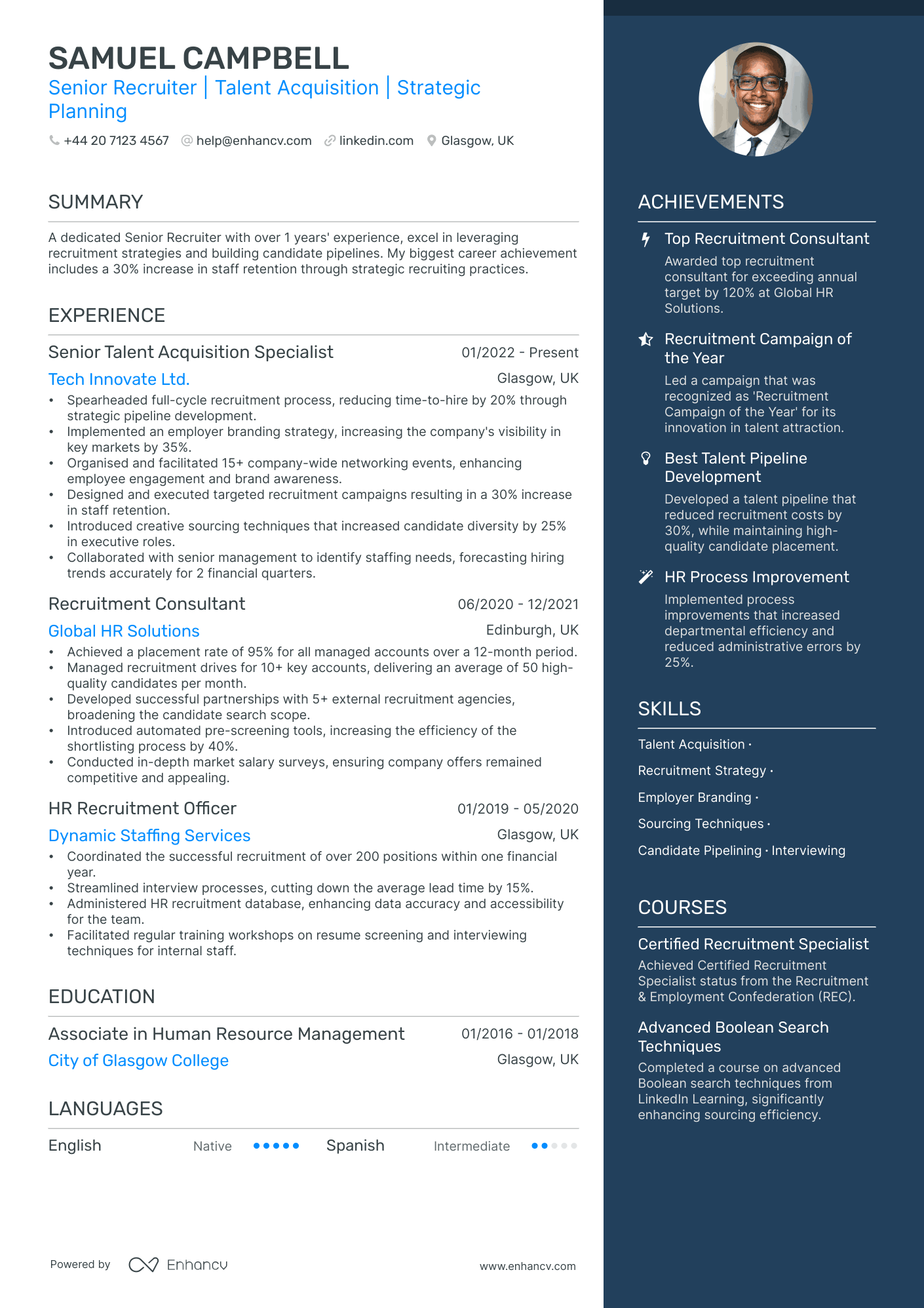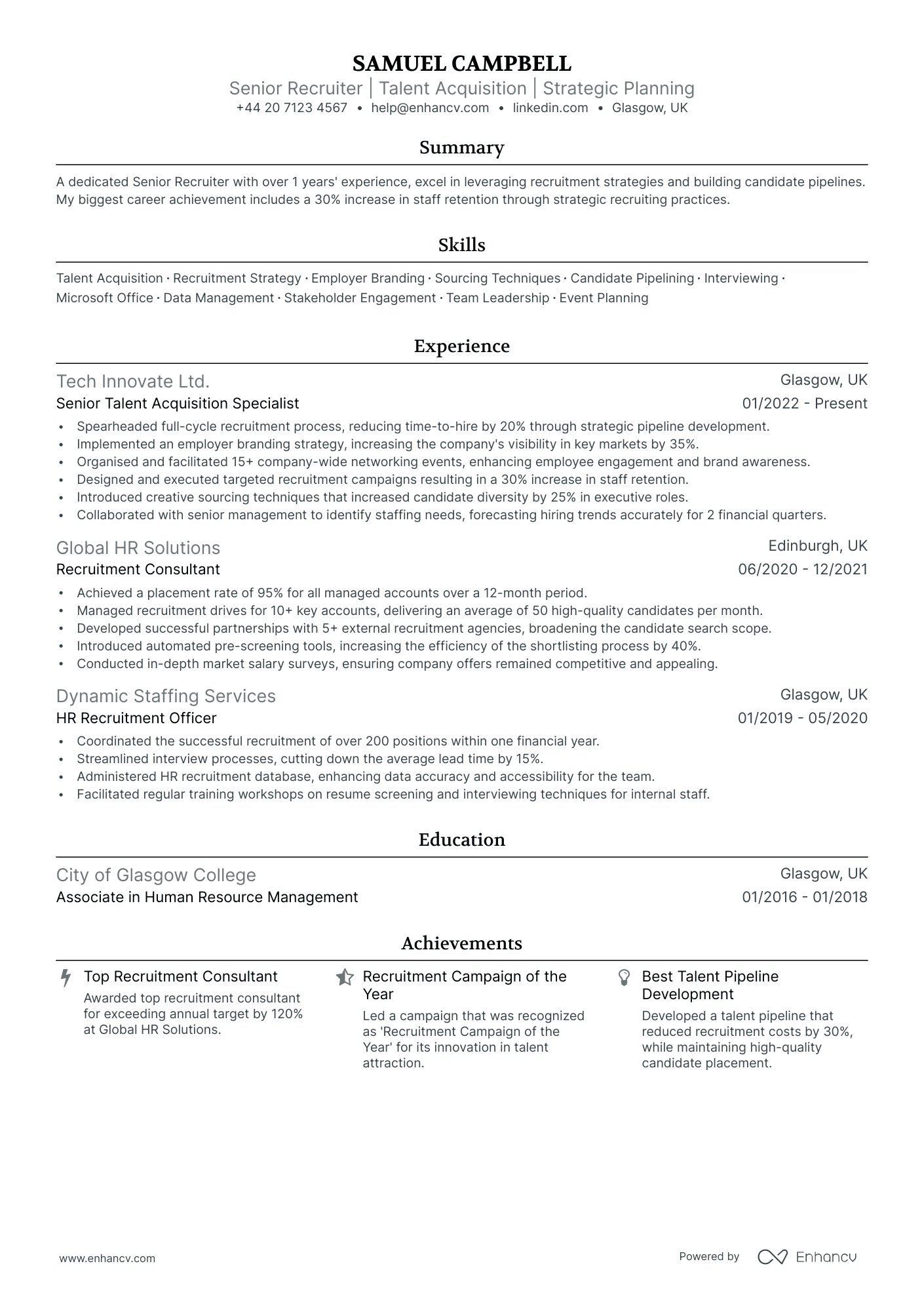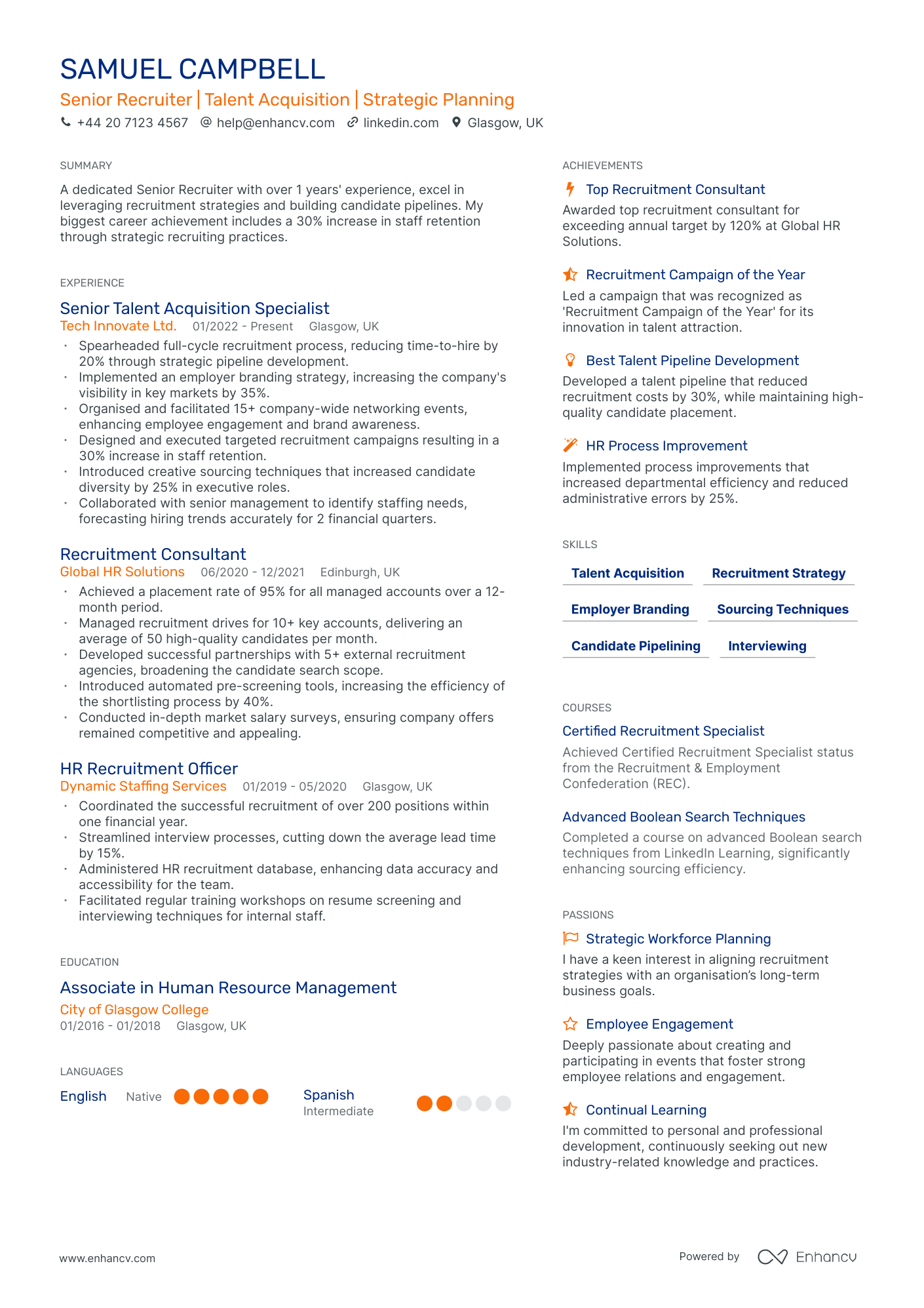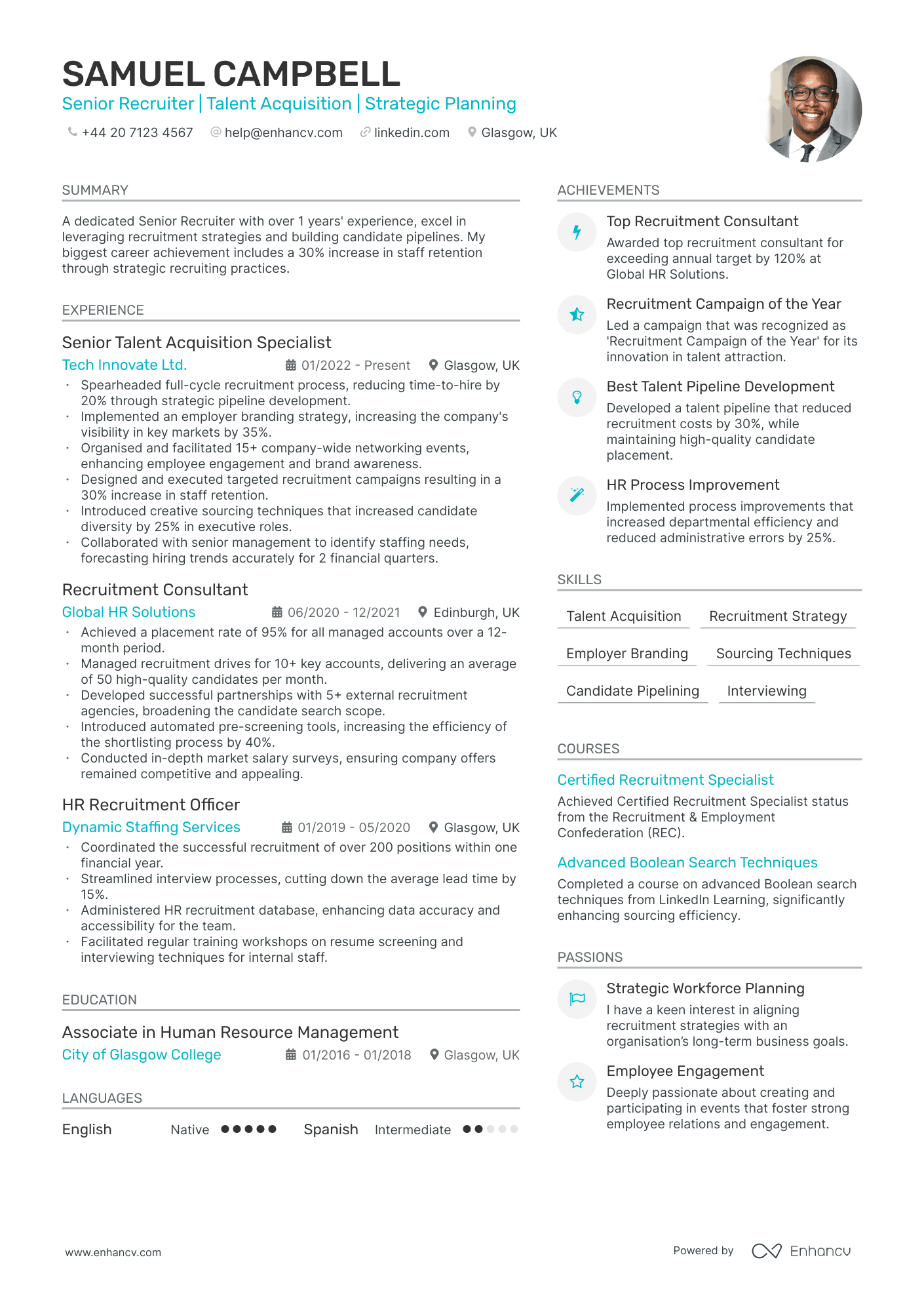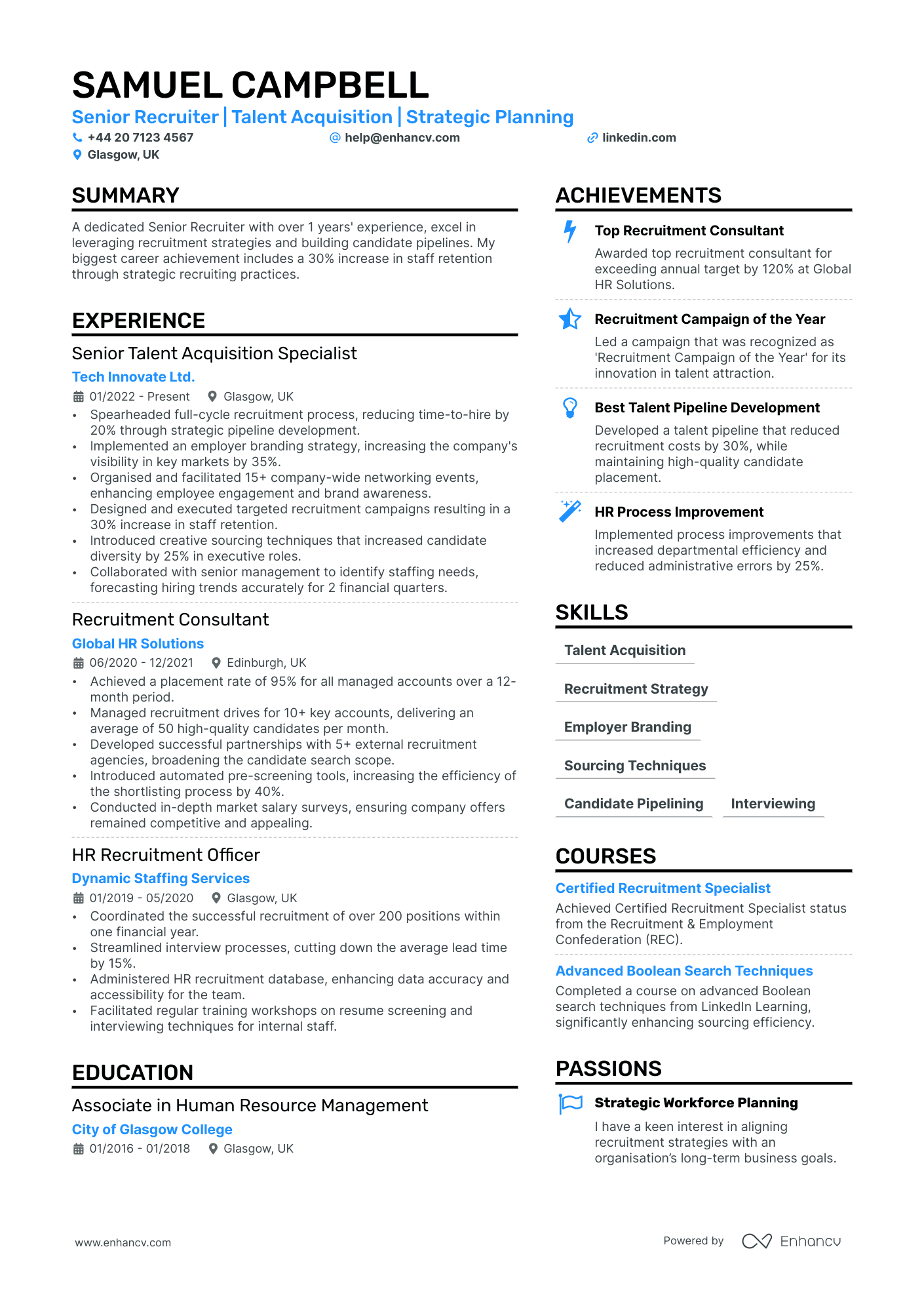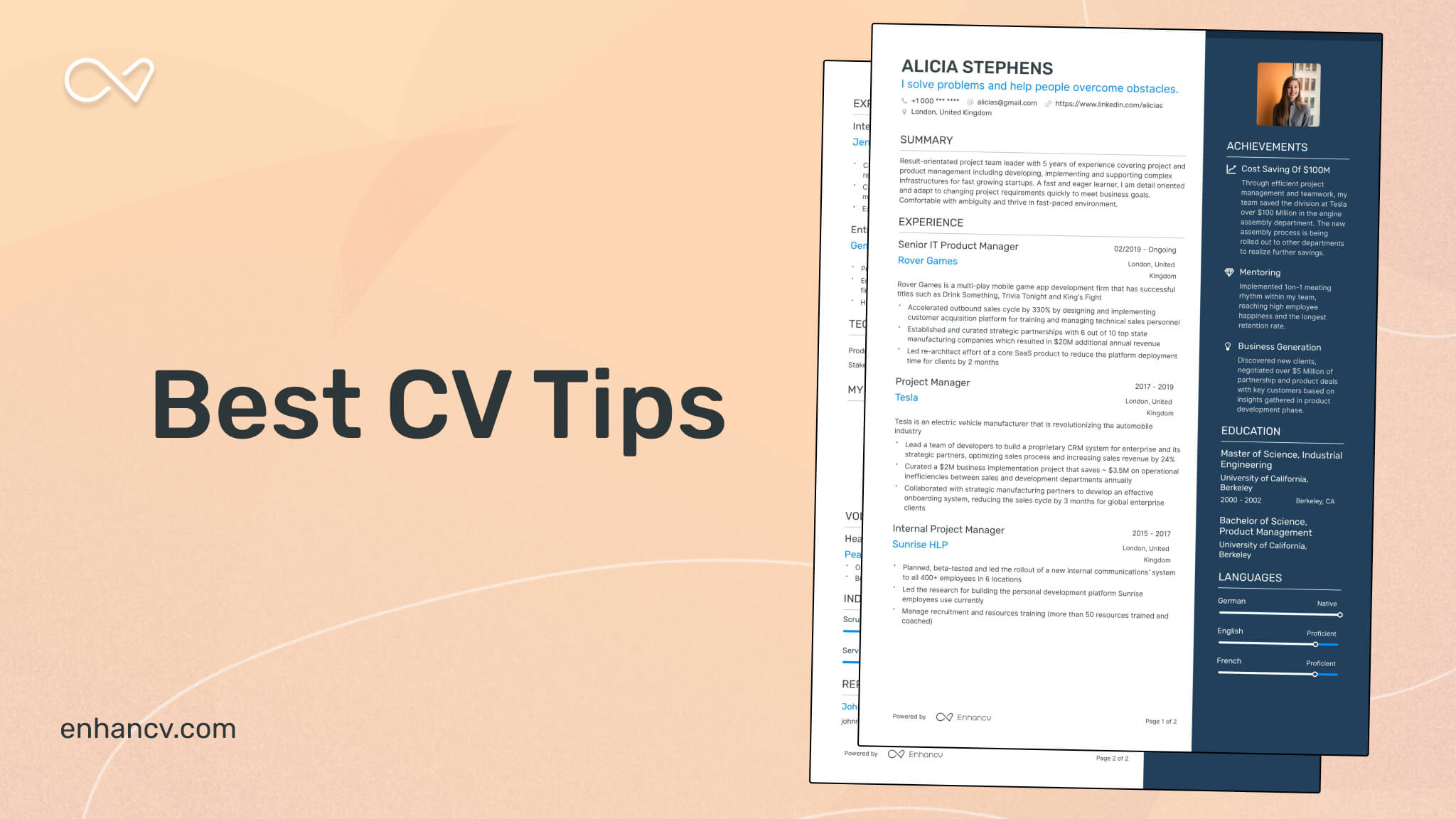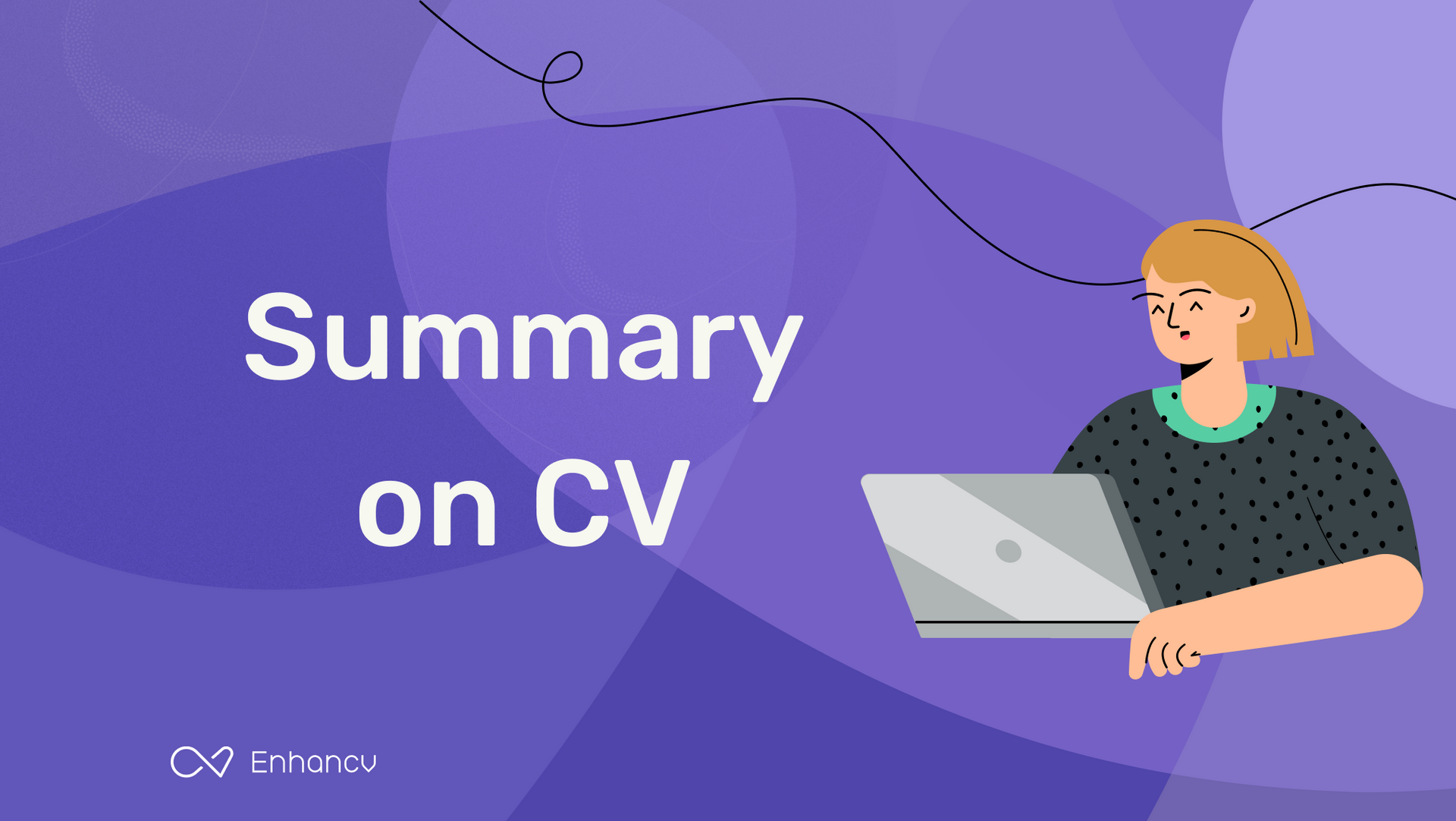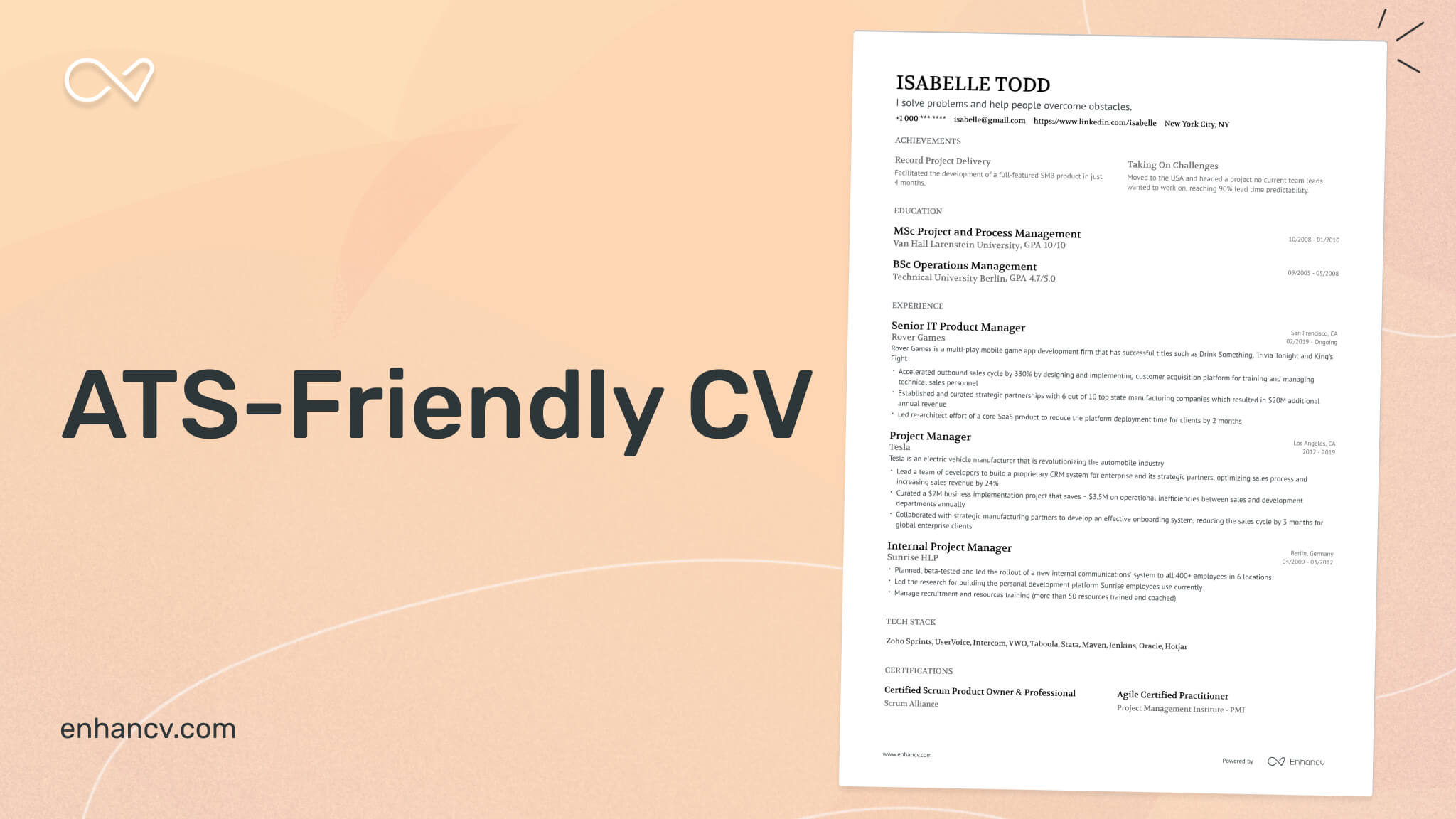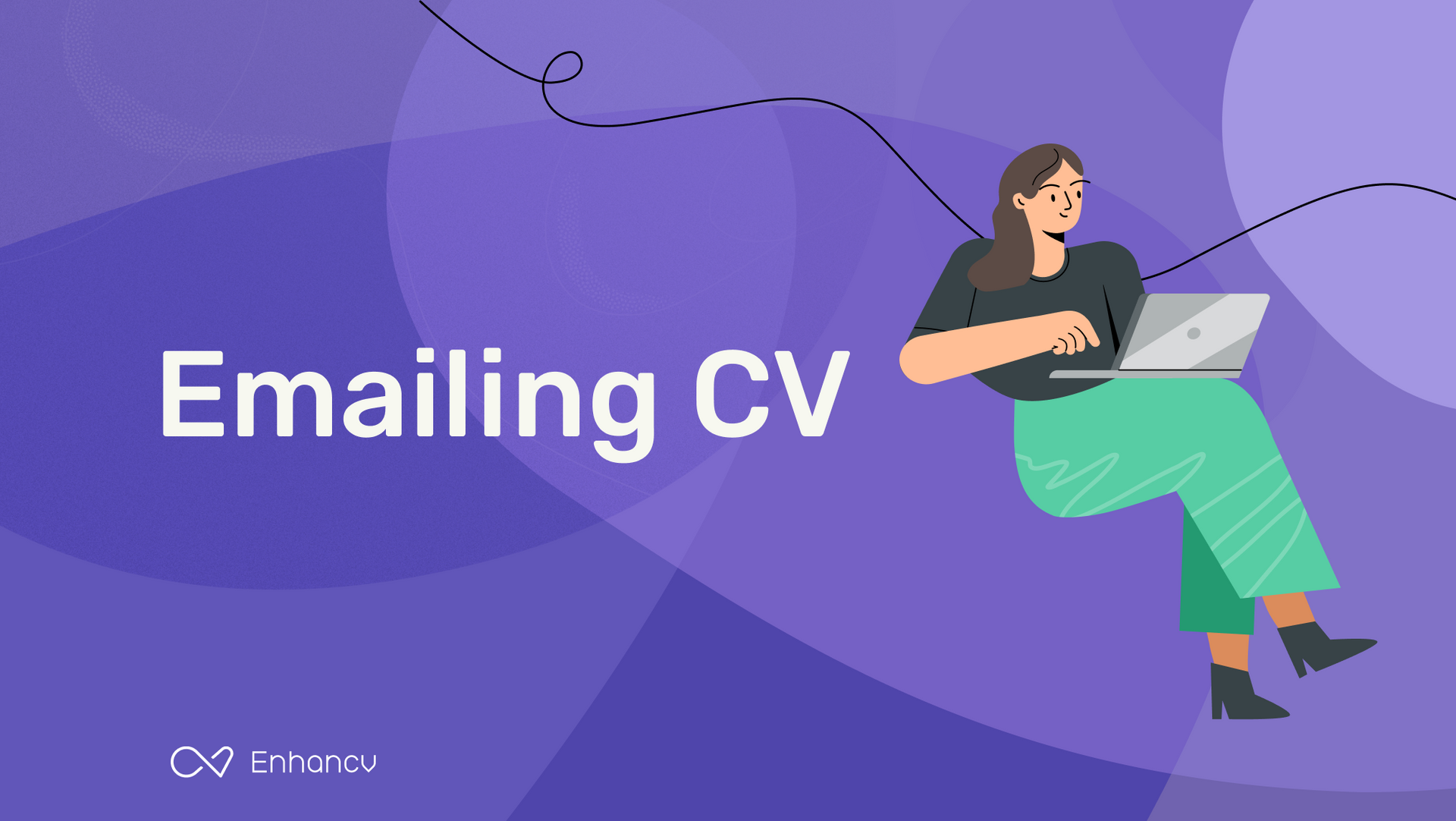Determining a candidate's true level of expertise from a cluttered CV is a common challenge faced by recruiters. Our comprehensive guide provides proven techniques to efficiently decode resume information, ensuring you accurately assess and identify the ideal applicants for your roles.
- Applying the simplest CV design, so that recruiters can easily understand your expertise, skills, and professional background;
- Ensuring you stand out with your header, summary or objective statement, and a designated skills section;
- Creating your CV experience section - no matter how much expertise you have;
- Using real life professional CV examples to enhance the structure and outline of your profile.
If you still have no muse to write your professional CV, find some more industry-leading examples.
How to ensure your profile stands out with your recruiter CV format
It's sort of a Catch 22. You want your recruiter CV to stand out amongst a pile of candidate profiles, yet you don't want it to be too over the top that it's unreadable. Where is the perfect balance between your CV format simple, while using it to shift the focus to what matters most. That is - your expertise. When creating your recruiter CV:- list your experience in the reverse chronological order - starting with your latest roles;
- include a header with your professional contact information and - optionally - your photograph;
- organise vital and relevant CV sections - e.g. your experience, skills, summary/ objective, education - closer to the top;
- use no more than two pages to illustrate your professional expertise;
- format your information using plenty of white space and standard (2.54 cm) margins, with colours to accent key information.
Once you've completed your information, export your recruiter CV in PDF, as this format is more likely to stay intact when read by the Applicant Tracker System or the ATS. A few words of advice about the ATS - or the software used to assess your profile:
- Generic fonts, e.g. Arial and Times New Roman, are ATS-compliant, yet many candidates stick with these safe choices. Ensure your CV stands out by using a more modern, and simple, fonts like Lato, Exo 2, Volkhov;
- All serif and sans-serif fonts are ATS-friendly. Avoid the likes of fancy decorative or script typography, as this may render your information to be illegible;
- Both single- and double-column formatted CVs could be assessed by the ATS;
- Integrating simple infographics, icons, and charts across your CV won't hurt your chances during the ATS assessment.
PRO TIP
Use font size and style strategically to create a visual hierarchy, drawing the reader's eye to the most important information first (like your name and most recent job title).
The top sections on a recruiter CV
- Career Summary demonstrates your overarching recruitment expertise.
- Key Recruitment Skills section highlights your specific strengths in talent acquisition.
- Professional Experience lists your past roles and contributions as a recruiter.
- Education and Certifications showcase relevant training and official credentials.
- Industry Knowledge and Tools familiarises the reader with your technological proficiency and sector-specific acumen.
What recruiters value on your CV:
- Highlight your understanding of the recruitment lifecycle by detailing your experience with sourcing, screening, interviewing, and placing candidates in relevant sections.
- Emphasise your proficiency with recruitment software and applicant tracking systems (ATS) to showcase your technical aptitude in managing recruitment processes efficiently.
- Illustrate your ability to communicate effectively by providing examples of building relationships with hiring managers and candidates, along with successful placements you've achieved.
- Demonstrate your knowledge in various recruitment methodologies by mentioning any expertise in headhunting, executive search, or mass hiring, tailored to the roles you've recruited for.
- Feature any relevant recruitment qualifications or training you've undertaken, such as CIPD certifications, to establish your commitment to professional development in the field.
Recommended reads:
Our checklist for the must-have information in your recruiter CV header
Right at the very top of your recruiter CV is where you'd find the header section or the space for your contact details, headline, and professional photo. Wondering how to present your the name of the city you live in and the country abbreviation as your address;
- are tailored to the role you're applying for by integrating key job skills and requirements;
- showcase what your unique value is, most often in the form of your most noteworthy accomplishment;
- select your relevant qualifications, skills, or current role to pass the Applicant Tracker System (ATS) assessment. Still not sure how to write your CV headline? Our examples below showcase best practices on creating effective headlines:
Examples of good CV headlines for recruiter:
- Talent Acquisition Lead | Tech & Digital Recruitment Specialist | CIPD Certified | 8+ Years Experience
- Senior HR Recruiter | Diversity & Inclusion Advocate | Employee Relations Expert | 10 Years in Recruitment
- Recruitment Consultant | Sales & Marketing Roles | 360° Recruitment Cycle | 5 Years Progressive Experience
- Graduate Recruitment Manager | University Partnerships | Assessment Centre Design | 7 Years Sector Experience
- Executive Search Specialist | C-Level Placement | Financial Services Focus | 12 Years Industry Expertise
- Entry-Level Recruiter | IT & Engineering Recruitment | ATS Proficient | 3 Years Dedicated Service
Choosing your opening statement: a recruiter CV summary or objective
At the top one third of your CV, you have the chance to make a more personable impression on recruiters by selecting between:
- Summary - or those three to five sentences that you use to show your greatest achievements. Use the CV summary if you happen to have plenty of relevant experience and wish to highlight your greatest successes;
- Objective - provides you with up to five sentences to state your professional aims and mission in the company you're applying for
CV summaries for a recruiter job:
How to meet job requirements with your recruiter CV experience
We've now reached the essence of your actual CV - your experience section. This is the space where you can list your career roles and on-the-job successes. Many candidates tend to underestimate just how much time and effort they should put into writing this CV section. Your experience shouldn't be a random list of your responsibilities, but instead:
- Match the job description with your skills, values, and accomplishments;
- Start each bullet with a strong action verb, followed up with one key skill and your outcome of applying this skill;
- Spotlight parts of your career history that are relevant to the job you're applying for.
Before we move on, make sure to check out some professional CV experience sections.
Best practices for your CV's work experience section
- Led end-to-end recruitment processes for mid to senior-level positions across various industries, achieving a 95% success rate in candidate placement within designated time frames.
- Established and maintained strong relationships with hiring managers to fully understand their staffing needs and company culture, resulting in a 20% reduction in time-to-hire.
- Implemented creative sourcing strategies, including social media outreach and networking events, to attract a diverse pool of qualified candidates.
- Conducted initial candidate screenings and behavioural-based interviews to assess compatibility with role requirements, improving the quality of shortlisted candidates by 30%.
- Designed and facilitated assessment centres and interview days, coordinating with multiple stakeholders to ensure a seamless and efficient process.
- Utilised Applicant Tracking Systems (ATS) and CRM software to track candidate progress and maintain up-to-date candidate records, enhancing data-driven recruitment decisions.
- Developed and delivered recruitment training modules to upskill new hires in the recruitment team, fostering a collaborative and high-performing team environment.
- Negotiated job offers and handled complex salary discussions, resulting in a high acceptance rate while ensuring equity and adherence to budget constraints.
- Played a key role in employer branding initiatives by representing the company at industry events and career fairs, enhancing the organisation's image as an employer of choice.
- Spearheaded recruitment initiatives for advanced technical roles, successfully placing over 120 candidates within the software development and IT sectors.
- Implemented a streamlined candidate sourcing strategy using AI-powered tools, enhancing our talent pool by 40% within the first year.
- Collaborated with high-profile clients to develop a comprehensive understanding of their staffing needs, leading to a 25% increase in client satisfaction rates.
- Managed a team of 5 recruiters and oversaw the hiring process for executive and managerial positions, filling an average of 60 key roles per year.
- Designed and facilitated in-house recruitment training programs, resulting in a 35% increase in team efficiency and shorter hiring cycles.
- Negotiated complex salary and benefits packages with top-tier candidates, ensuring competitive offers that aligned with our financial frameworks.
- Orchestrated diversity-focused hiring campaigns that increased workplace diversity by 50% over a two-year period.
- Worked closely with community organizations and educational institutions to attract and recruit underrepresented talent in various industries.
- Developed a diversity and inclusion training program for hiring managers, which improved cross-cultural competencies within the company.
- Delivered bespoke recruitment solutions to SMEs, contributing to an average of 30 successful hires per quarter.
- Established a robust network of industry professionals via LinkedIn and industry events, fostering a rich candidate database for specialized roles.
- Conducted in-depth market salary research to inform client talent acquisition strategies, resulting in competitive employer positioning within the market.
- Initiated and managed campus recruitment drives at 15 universities nationwide, yielding over 200 graduate hires for entry-level positions.
- Forged strong partnerships with university career services, enhancing brand visibility among the student population.
- Pioneered a mentorship program to transition new graduates into corporate roles, which improved retention rates by 10% within the first year.
- Directed IT recruiting strategies for mid to senior-level positions, achieving a consistent fill rate of 90% for all assigned requisitions.
- Introduced a new applicant tracking system that reduced time-to-hire by 15 days on average.
- Conducted quarterly data analysis on recruitment metrics to inform strategic decision-making and pinpoint areas for process improvement.
- Executed targeted recruitment campaigns for nursing and allied health professional roles across 25 healthcare facilities.
- Championed a referral program that incentivized current employees to refer candidates, resulting in a 20% increase in hires from referrals.
- Worked collaboratively with hiring managers to understand the nuances of specialized healthcare roles, ensuring highly accurate candidate-job fit.
- Focused on C-suite and director-level search mandates, successfully closing an average of 12 high-stakes placements per year.
- Utilized headhunting techniques to source elusive top-tier executive talent for Fortune 500 companies.
- Developed a proprietary evaluation framework that enhanced the objectivity and rigor of the executive selection process.
- Facilitated the staffing of contract, temporary, and permanent positions across multiple industries, averaging 80 placements per quarter.
- Crafted individualized candidate marketing plans to effectively showcase the unique skills and qualifications to prospective employers.
- Performed meticulous applicant vetting and reference checks to ensure high-quality candidate submissions to our business clients.
- Oversaw the operational aspects of recruitment campaigns, from job posting to final onboarding, ensuring seamless experiences for both candidates and teams.
- Streamlined recruitment procedures, cutting down average hiring timeframes by 18%, while maintaining high-quality candidate pools.
- Collated and analyzed recruitment data to produce monthly reports for senior management, highlighting key insights for strategic planning.
What to add in your recruiter CV experience section with no professional experience
If you don't have the standard nine-to-five professional experience, yet are still keen on applying for the job, here's what you can do:
- List any internships, part-time roles, volunteer experience, or basically any work you've done that meets the job requirements and is in the same industry;
- Showcase any project you've done in your free time (even if you completed them with family and friends) that will hint at your experience and skill set;
- Replace the standard, CV experience section with a strengths or achievements one. This will help you spotlight your transferrable skills that apply to the role.
Recommended reads:
PRO TIP
If applicable, briefly mention a situation where things didn’t go as planned and what you learned from it, demonstrating your ability to learn and adapt.
Key recruiter CV skills: what are hard skills and soft skills
Let's kick off with the basics. You know that you have to include key job requirements or skills across your CV. For starters, take individual skills from the job description and copy-paste them into your CV, when relevant. Doing so, you'll ensure you have the correct skill spelling and also pass the Applicant Tracker System (ATS) assessment. There are two types of skills you'll need to include on your CV:
- Hard skills - technical abilities that are best defined by your certificates, education, and experience. You could also use the dedicated skills section to list between ten and twelve technologies you're apt at using that match the job requirements.
- Soft skills - your personal traits and interpersonal communication skills that are a bit harder to quantify. Use various CV sections, e.g. summary, strengths, experience, to shine a spotlight on your workspace achievements, thanks to using particular soft skills.
Remember that your job-winning CV should balance both your hard and soft skills to prove your technical background, while spotlighting your personality.
Top skills for your recruiter CV:
Candidate Sourcing
Applicant Tracking Systems (ATS)
Recruitment Marketing
Interviewing Techniques
Employment Law Knowledge
Boolean Search
Talent Acquisition Strategies
HRIS Software Proficiency
Data Analysis
Employee Onboarding
Communication
Negotiation
Time Management
Problem-Solving
Decision-Making
Empathy
Active Listening
Adaptability
Teamwork
Persuasion
PRO TIP
If there's a noticeable gap in your skillset for the role you're applying for, mention any steps you're taking to acquire these skills, such as online courses or self-study.
CV education and certificates: your academic background as proof of your skill set
A common misconception about your recruiter CV education is that you only need it, if you have less professional experience. That is completely false. The CV education section serves to back up your technical (and sometimes personal) capabilities, fill in gaps in your work history, and show you have the initial industry background and know-how. When creating your education section:
- List your degrees in the reverse chronological order, starting with the most recent (and relevant) ones first;
- Include your degree and university names, start and graduation dates. It's optional to also denote you received a "First-Class Honours" for diplomas that are more relevant to the role;
- Curate your relevant university coursework, projects, or thesis work if you happen to have less professional expertise and need to integrate more job keywords and skills.
Your professional qualifications don't need to stop at your academic background. It's advisable to also select up to three of your most noteworthy (and relevant) industry certificates and feature them in a dedicated section. Once more, include the certificate name, the institution that issued it out, and the date you obtained it on. You could feature both hard skills and soft skills certificates, as in the examples below:
PRO TIP
If there's a noticeable gap in your skillset for the role you're applying for, mention any steps you're taking to acquire these skills, such as online courses or self-study.
Recommended reads:
Key takeaways
Impressing recruiters with your experience, skill set, and values starts with your professional recruiter CV. Write concisely and always aim to answer job requirements with what you've achieved; furthermore:
- Select a simple design that complements your experience and ensures your profile is presentable;
- Include an opening statement that either spotlights your key achievements (summary) or showcases your career ambitions (objective);
- Curate your experience bullets, so that each one commences with a strong, action verb and is followed up by your skill and accomplishment;
- List your hard and soft skills all across different sections of your CV to ensure your application meets the requirements;
- Dedicate space to your relevant higher education diplomas and your certificates to show recruiters you have the necessary industry background.
